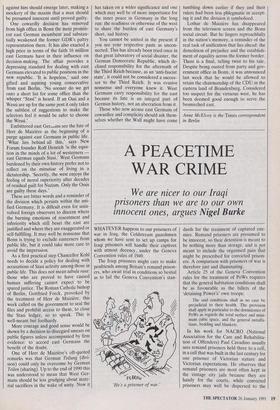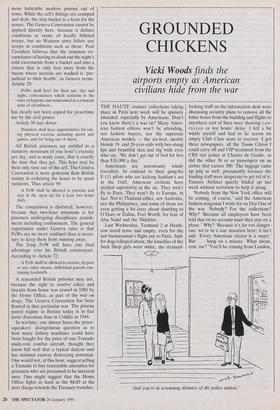A PEACETIME WAR CRIME
We are nicer to our Iraqi prisoners than we are to our own
innocent ones, argues Nigel Burke WHATEVER happens to our prisoners of war in Iraq, the Coldstream guardsmen whom we have sent to set up camps for Iraqi prisoners will handle their captives with utmost decency, under the Geneva Convention rules of 1949.
The Iraqi prisoners might care to make penfriends among Britain's remand prison- ers, who await trial in conditions so bestial as to fail the Geneva Convention's stan- We's a prisoner of war.' dards for the treatment of captured ene- mies. Remand prisoners are presumed to be innocent, so their detention is meant to be nothing more than storage, and is not meant to include the organised pain that might be prescribed for convicted prison- ers. A comparison with prisoners of war is therefore just and illuminating.
Article 25 of the Geneva Convention rules for the treatment of PoWs requires that the general habitation conditions shall be as favourable as the billets of the 'detaining Power's' own troops:
The said conditions shall in no case be prejudicial to their health. The provision shall apply in particular to the dormitories of PoWs as regards the total surface and mini- mum cubic space, and the general installa- tions, bedding and blankets.
In his work for NACRO (National Association for the Care and Rehabilita- tion of Offenders) Paul Cavadino usually sees remand prisoners held three to a cell, in a cell that was built in the last century for one prisoner of Victorian stature and Victorian expectations. He observes that remand prisoners are most often kept in the vintage city jails because they are handy for the courts, while convicted prisoners may well be dispersed to the more habitable modern prisons out of town. While the cell's fittings are cramped and drab, the slop bucket is a feast for the senses. The Geneva Convention cannot be applied directly here, because it defines conditions in terms of locally billeted troops, but no Western army billets any troops in conditions such as those. Paul Cavadino believes that the common cir- cumstance of having to slosh out the night's cold excrements from a bucket and into a cistern that is only feet away from the basins where utensils are washed is 'pre- judicial to their health', in Geneva terms. Article 29:
PoWs shall have for their use, day and night, conveniences which conform to the rules of hygiene and maintained in a constant state of cleanliness,
has clearly not been copied for peacetime use by the civil power. Article 38 lays down:
Prisoners shall have opportunities for tak- ing physical exercise including sports and games, and for being out of doors.
All British prisoners are entitled to a statutory minimum of one hour's exercise per day, and in many cases, that is exactly the time that they get. This hour may be their only time out of the cell. The Geneva Convention is more generous than British statute in ordaining the hours to be spent outdoors. Thus article 98:
A PoW shall be allowed to exercise and stay in the open air for a least two hours daily.
The comparison is distorted, however, because that two-hour minimum is for prisoners undergoing disciplinary punish- ments including confinement. The general expectation under Geneva rules is that PoWs are no more confined than is neces- sary to keep them from running away.
The Iraqi PoW will have one final advantage over his British counterpart. According to Article 72:
A PoW shall be allowed to receive, by post or any other means, individual parcels con- taining foodstuffs . . .
A remanded British prisoner may not, because the right to receive cakes and biscuits from home was erased in 1988 by the Home Office, as part of the war on drugs. The Geneva Convention has been flouted in that particular war. The prisons parcel regime in Britain today is in fact more draconian than in Colditz in 1944.
In wartime, one always hears the peace- squeakers' disingenuous question as to how many kidney machines could have been bought for the price of one Tornado multi-role combat aircraft, thought they know full well that a typical dialysis unit has minimal runway destroying potential. One would not, at this hour, suggest selling a Tornado to buy reasonable amenities for prisoners who are presumed to be innocent men. One might suggest that the Home Office fights as hard as the MoD at the next charge towards the Treasury trenches.



























































 Previous page
Previous page